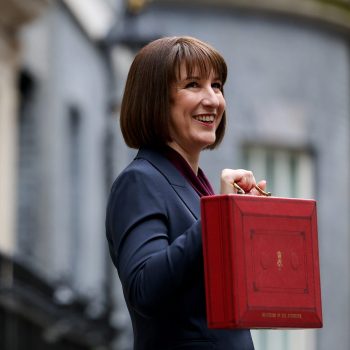Spirits industry pleads for lifeline ahead of UK budget
The Scotch Whisky Association has urged the government to put a multi-year freeze on spirits duty ahead of the autumn budget on 26 November.

Following confirmation that the autumn budget will be held on 26 November, the Scotch Whisky Association (SWA) has urged chancellor Rachel Reeves to freeze spirits duty for multiple years.
Alcohol duty in the UK increased by 3.65% in February, in line with the Retail Price Index (RPI). The spring’s budget was claimed to have ‘ignored’ spirits and hospitality.
SWA chief executive Mark Kent said Reeves has “84 days to make the decision to support Scotch whisky”, and fulfil prime minister Keir Starmer’s promise to “back Scotch producers to the hilt”.
Kent says that despite April’s increases to National Insurance contributions (NIC) and minimum wage, “tax receipts have not gone up” and more “UK pubs and restaurants have been forced to close”.
“Everyone connected with the hospitality industry knows that pubs, restaurants and other venues cannot survive on beer alone – all rely on spirits for profits,” he continued.
“That is why we are calling for the chancellor to announce a multi-year freeze on spirits duty, spanning the lifetime of this parliament; and to ensure that the tax differential with other alcohol categories, which puts Scotch at a competitive disadvantage, does not widen.
“This would also give respite to the Scottish economy – 70% of all UK spirits are produced in Scotland. 84 days. Back Scotch, support Scotland, and sustain growth across the UK.”
Lifeline for Scotch
According to the SWA, more than 1,000 jobs in the Scotch industry have been lost since the last budget.
If tax is increased again in the upcoming autumn budget, distillers believe they will be forced to reduce investment with further job losses expected.
Many also believe they have to defer investment outside of the UK.
A Survation Poll commissioned in November 2024, just after Reeves increased alcohol duty again in her first budget last autumn, revealed 66% of respondents felt as though prime minister Starmer had broken his commitment to the Scotch industry.

In November 2003, Starmer was quoted to have said: “It’s clear Scotland’s whisky industry isn’t getting the stability it needs from the Tories and the SNP. Labour will put growth at the heart of our government and back Scotch producers to the hilt.”
He then doubled down on his pledge earlier this year, saying he will “fight tooth and nail” to protect Scotch whisky.
Kent said: “Distillers are right to raise the alarm. Job losses and cancelled investment is the same story we hear right across the industry as a direct result of the high domestic tax burden.
“We know that this will need to be a revenue raising budget, and the only way the chancellor can do that through alcohol duty is to reduce the tax burden on Scotch whisky and other spirits. That is self-evident from the government’s own economic data, showing tax rises over the past two years have lost the Treasury over £600m in revenue.”
“The industry’s case to the PM and chancellor will include highlighting hospitality businesses’ dependence on Scotch and other spirits for their own future. Industry figures show 38% of the profits made by bars and restaurants come from spirits.”
SWA noted that whisky bosses will lay out the industry’s ‘stark’ future to the treasury in the coming weeks, in the hope the Starmer and Reeves keep their promise to back the sector.
Now is the time for action
Meanwhile, Billy Walker, master distiller at Glenallachie, said over the course of his 50-year-plus career in the industry: “Rarely, if ever, has there been a time of such peril to the long story of Scotch.
“Some of the challenges the industry faces the government can’t address, and we accept that. But the high tax burden is something the government can take action on,” he added.
Echoing the sentiment, Barry O’Sullivan, managing director of Diageo UK, urged the chancellor to support Scotch, which he called “a historic, UK homegrown industry that not only supports thousands of jobs but flies the flag for the UK on quality and craftsmanship around the world.”
Owner and operator of The Malt Rooms in Invernes, Matt Macpherson, noted that pubs and bars cannot sustain themselves on beer sales alone and the current alcohol regime appears “to disproportionately favour beer, placing venues like ours – where premium spirits, especially Scotch whisky, are central – at a disadvantage”.
Leon Thompson, executive director – Scotland, UK Hospitality added: “With spirits accounting for 38% of a venues alcohol profits, action to freeze excise duty would be a welcome help.”
In the two years since the historic 10.1% spirits tax rise was introduced by the UK government, spirit duties in the UK have risen by 14%.
Related news
Welsh Budget ‘disastrous’ for on-trade
UKHospitality: Scottish Budget goes 'nowhere near far enough'
